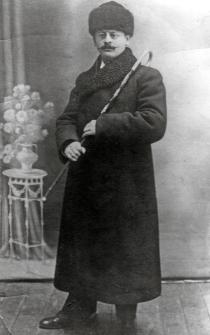This is my father Boris Dener. This photo was taken in Falesti in the 1920s. My mother sent this photo to Argentina, to my father's sister whose name I don't know. After WWII our Argentinian relatives sent it to my sister Sarah in Israel since none of us had any family photographs left.
My father was born in Kishinev in 1884. I never asked him about his education, but it's evident that he finished a grammar school. He spoke fluent Russian, Romanian and German. He also had some professional education since he worked at the affiliate of the Bessarabian Bank in Falesti. He was a manager or chief accountant there. He married my mother, when she was 18.
My father was of average height, very dignified, with an upturned moustache, and a pince-nez with a golden rim. I remember that other people called my father 'the banker' for his management of the Jewish community mutual aid fund. My father was a well-respected man in town. He was a member of the Jewish Arbitrary Court [bet din] where Jews brought forward their problems and disputes. They addressed my father and each party sent its representative. I already knew that when my father ushered new people to the living room and looked at me strictly, it meant that I had to go to my room. In the 1990s I read in an article by a Jewish historian from Kishinev that my father had been engaged in politics in the early 1930s. He was one of the founders and later the leaders of the Romanian Jewish Party. In 1933 this Party had its own list for participation in the parliamentary elections. My father was the third on this list and lacked only a few votes to become a deputy of the Romanian Parliament. My father was a man of the world, but he went to the synagogue on Jewish holidays.
On 28th June 1940, the Soviet rule began in Bessarabia. In 1941, on the night of 13th to 14th June, two officers wearing NKVD uniforms and two witnesses came to our home. They woke us up, searched our lodging and told us, 'You have 20 minutes to get ready and leave the place!' We were taken to the railway station. Before we arrived in Tiraspol, they made lists of all men, heads of families, and on the night of 15th June they read out the list and the men were getting off the train. We never saw my father again. As we got to know later, all men were taken to a camp in Ivdel district, Sverdlovsk region. My father died there on 1st November 1941.


















